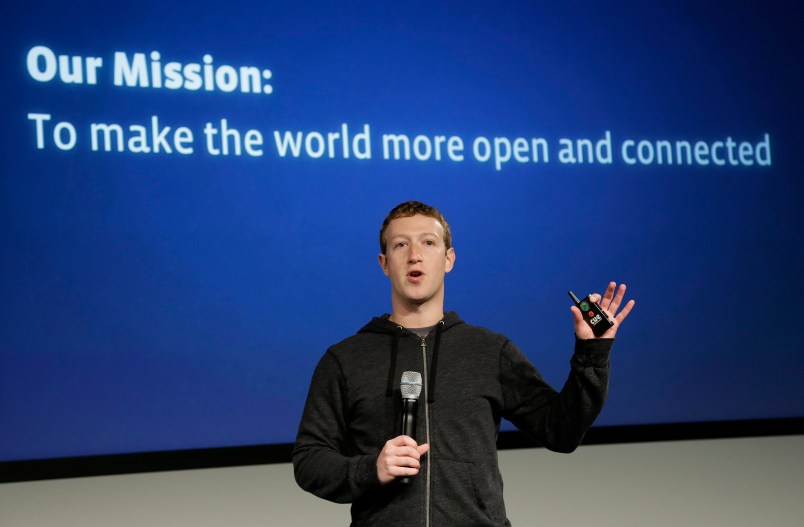We’ve seen a handful of very interesting articles over the last few days about Russian efforts to spread pro-Trump political propaganda on Facebook as part of their larger 2016 dis-information operation. As we noted last week, the seemingly paltry sum of $100,000 may belie the reach that was possible for that amount of money, given the way that the Facebook ecosystem can be used to amplify messages through a mix of highly targeted advertising and troll armies. The Facebook campaign also seems to include the first evidence of Russian operatives attempting to organize actual political events on American soil, as opposed to just spreading memes and fake news on the web.
But there’s a separate, broader issue I would like to focus on.
Look at this passage from yesterday’s article from the Times by Scott Shane (emphasis added) …
Facebook officials, speaking on the condition of anonymity, said they had found a small number of additional events announced by the Russia-created pages and were looking for more. They declined to give examples.
The new revelations stepped up pressure on Facebook to make public more of what it knows about the Russian propaganda operations.
So it’s not just that one event. They’ve already found more and are still looking. But that’s private.
A separate article by Yahoo’s Mike Isikoff reports that Trevor Potter, a former FEC Chair and president of the Campaign Legal Center, wrote a letter to Facebook and Chairman Mark Zuckerberg yesterday calling on Facebook to release the information and upping the ante by writing this (emphasis added): “[B]y hosting these secretly-sponsored Russian political ads, Facebook appears to have been used as an accomplice in a foreign government’s effort to undermine democratic self-governance in the United States. Therefore, we ask you, as the head of a company that has used its platform to promote democratic engagement, to be transparent about how foreign actors used that same platform to undermine our democracy.”
Facebook has said that it can’t release its findings because that would violate its own ‘internal policies’ which protect user privacy. That’s rich.
I believe what we’re seeing here is a convergence of two separate but highly charged news streams and political moments. On the one hand, you have the Russia probe, with all that is tied to that investigation. On another, you have the rising public backlash against Big Tech, the various threats it arguably poses and its outsized power in the American economy and American public life. A couple weeks ago, I wrote that after working with Google in various capacities for more than a decade I’d observed that Google is, institutionally, so accustomed to its customers actually being its products that when it gets into lines of business where its customers are really customers it really doesn’t know how to deal with them. There’s something comparable with Facebook.
Facebook is so accustomed to treating its ‘internal policies’ as though they were something like laws that they appear to have a sort of blind spot that prevents them from seeing how ridiculous their resistance sounds. To use the cliche, it feels like a real shark jumping moment. As someone recently observed, Facebook’s ‘internal policies’ are crafted to create the appearance of civic concerns for privacy, free speech, and other similar concerns. But they’re actually just a business model. Facebook’s ‘internal policies’ amount to a kind of Stepford Wives version of civic liberalism and speech and privacy rights, the outward form of the things preserved while the innards have been gutted and replaced by something entirely different, an aggressive and totalizing business model which in many ways turns these norms and values on their heads. More to the point, most people have the experience of Facebook’s ‘internal policies’ being meaningless in terms of protecting their speech or privacy or whatever as soon as they bump up against Facebook’s business model.
This isn’t the first Facebook controversy of course. Nor is it entirely clear yet how much this substantively connects to the Russia story. Is this just one relatively small tentacle of the larger Russian influence operation? Or is Facebook a bigger part of this than we realize? Regardless of the answer to that question, the political momentum of the Russia probe seems to be on a collision course with Facebook’s longstanding presumption, myopia and generalized illusion that it is the custodian of a national (and international) community as opposed to – let’s get real – just a website. It feels like this might be a moment or maybe the moment when the truthiness of Facebook’s rights and privacy and community talk simply collapses under the weight of its own ridiculousness.
Really. Who really cares about the ‘internal policies’ that Facebook promulgated last week and will revise next week?
Now, it’s been suggested to me that this may not really be about Facebook’s ‘internal policies’, or not solely about them. It may be about this 2011 consent decree which Facebook entered into with the FTC in which it agreed not to arbitrarily ignore the privacy promises it makes to its users. Perhaps Facebook is afraid of running afoul of that agreement? Maybe. Who knows? It certainly would seem to me that the fraudulent nature of the phony Russian accounts would trump those guidelines. But I’ll leave that to lawyers and people who know this subject better to figure out. Maybe Facebook doesn’t want to remind people that it’s under a 20 year consent decree because of its indifference to the promises it makes to its users. I’d like to find out.
Regardless of that, I think the political juice of the Russia story is pushing Facebook toward a bruising encounter with the reality that it’s not God, not a government, not the law. It’s just a website. It can’t happen soon enough.






